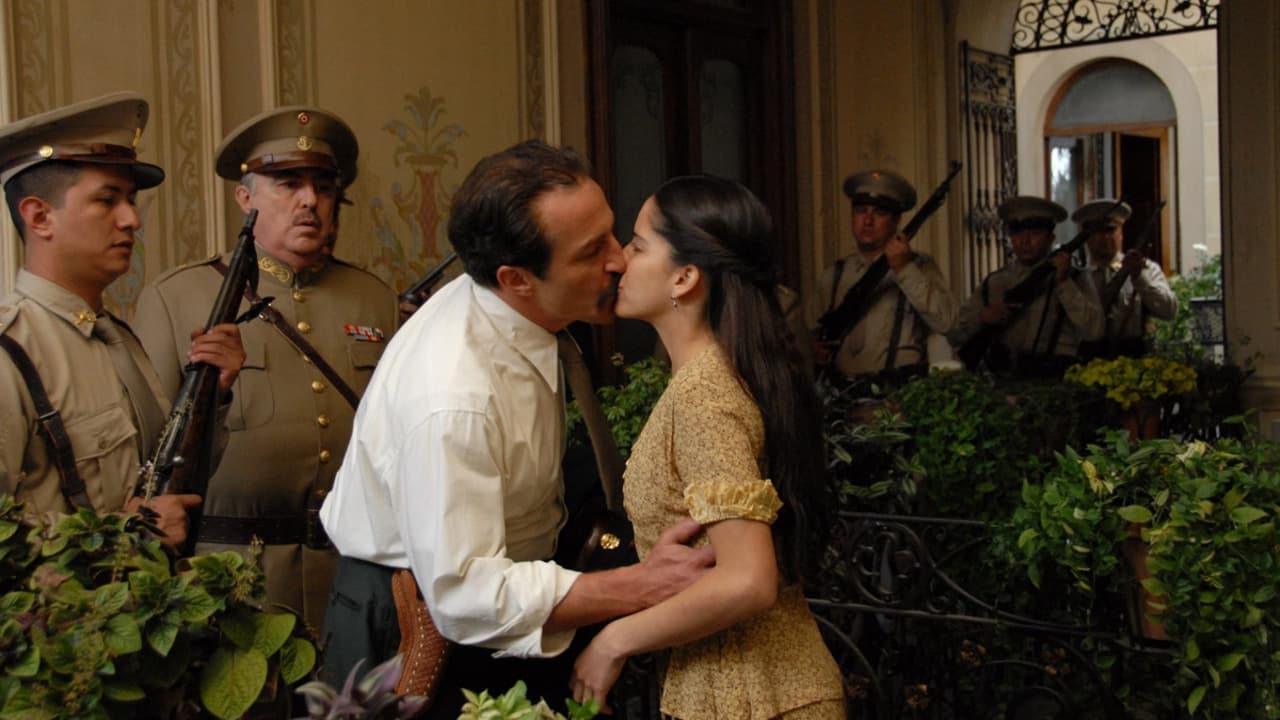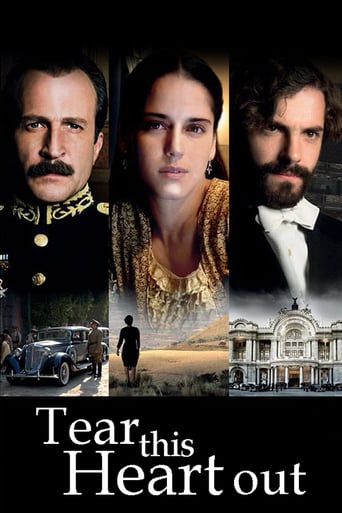Pacionsbo
Absolutely Fantastic
Lachlan Coulson
This is a gorgeous movie made by a gorgeous spirit.
Philippa
All of these films share one commonality, that being a kind of emotional center that humanizes a cast of monsters.
bland-kevin67
I love the drive in this movie. It sweeps from country to city with wonderful undertones and great panoramic scenes. The actors did a great job and the directing was superb. The story is told in a hurry up and wait fashion that I usually see in Italian films. The ruthlessness of the general is played down with the tender way he treats his wife and family. It leaves you confused and unsure who to root for. I also love when actors can pull of playing very young to mature and have you believing it. Entitlement is a universal theme where the very rich takes advantage of the poor. I loved the lead actress how she played the part and the story kept going as if it would never end and you wanted to keep watching. It kind of makes one wish there was a sequel to this historic fiction based upon real characters.
MarianoDanush
This movie may contain some strong scenes, but it is a good screenplay that becomes great by the excellent performance of Daniel Gimenez Cacho. Ana Claudia Talancon makes a good performance look even better by her beauty. But unfortunately not all actors in this movie are good, I'm talking of the horrible work that Jose Maria de Tavira does in this movie, its a bad acting work but it looks like garbage compared to his coworker Gimenez Cacho. The screenplay its a great adaptation of the books written by Angeles Mastretta, this screenplay was done by the author of the book and the director, Roberto Sneider. The movie takes a theme that reminds you of La Ley de Herodes, so it portrays the old fashion politicians in Mexico, which still exist. The directors work is a good work which makes you try to remember his name, i personally hadn't seen any of his previews works but now that I've seen this one I'm sure gonna see his next work, he directed Dos Crimenes with Pedro Armendariz Jr. and Damian Alcazar. The movie is worth seeing and you enjoy it a great deal thanks to the acting of Gimenez Cacho, i hope to see more lead roles from him. So i hope you enjoy this one, and it has been already released so i don't know why it is shown as in production still.
Nazi_Fighter_David
Mexican director Roberto Sneider wrote the script of "Tear This Heart Out" ("Arráncame la Vida") with the author and winner of the Mazatlán Prize for Literature for the best book of the year Ángeles Mastretta published in Mexico in 1985 partially inspired by the life of Maximino Ávila Camacho, a four-star general in Mexico's revolutionary forces, brother of Manuel Ávila Camacho who was President of Mexico from 1940 to 1946...The film opens with the beautiful Catalina Guzmán (Ana Claudia Talancón) marrying at her early age a charismatic and cunning general named Andrés Ascencio (Daniel Giménez Cacho), much older than her… Dazzled by his world, Catalina escorts him on his political campaigns, perceiving at his side the intriguing political systems to obtain social justice... Catalina, a smart but not an educated young woman, dedicates years of her youth to a 'loving' husband… She comes to Puebla to hear from the voice of her man, the governor of the beautiful city, that soon she will be the First Lady of Mexico as he considers himself the best-qualified candidate to win the race for the Presidency... But one day, Catalina finds out that her arrogant and prepotent macho man is cheating on her with several women and has several children out of that relationship… But in spite of all that, and observing her husband's pervert and bad manners, Catalina continues to live with Andrés, to bear his two children, to train his others children in her family, to serve him as his adviser and to guide him to win elections, taking intense pleasure from that attitude… Nevertheless she learns that life and power are not always so pink… There is a scene during her pregnancy, where we saw her detecting that she is totally neglected… So, for the first time we watch her taking pleasure in having a love affair with a teenager who cherished her dearly… But the movie takes a dramatic turn when Catalina falls really in love with a concertmaster... And it was forbidden for her to fall in love! And she executes her cruel vengeance on Andrés sharing the musician' bed ignoring the predestined course of his future fate… And here Roberto Sneider's motion picture clearly comes off with three significant national old traditions: the 1930's post-revolutionary Mexico, the very crucial point for the Mexican girl, the "rite of passage," and the traditional macho man… The film is a love story through which three main characters are important for the viewer: Andrés, the charming officer, the great orator with the voice so thrilling and so impacting… His wife Catalina divulging how meaningless and insincere his promises are… And Carlos (Jose María de Tavira), the leader of the orchestra, the future of a new Mexico, the rebel, and what Mexico is expecting from her younger men… The motion picture presents the concept of the long-suffering Mexican woman vanishing here with Catalina as seen powerful of character, efficacious and extreme in having an affair with the man she deeply falls in love, intense in degree to accept whatever she is asked from her lover to carry out… Her representation of the submissive wife, in a macho world where women are suppressed and their voices not heard, has fallen with her determined and ambivalent character here, as near Carlos, Catalina is another woman who wishes, requests, and desires intensely the enjoyment of her personal liberty and personal efficacy… The result is a fine rich movie with many captivating visuals of the stunning state of Puebla, and definitely a must-see, at least for the Mexican viewers
Alonso Fragua (esquizzo)
(Stupid IMDb. It doesn't get that I'm trying to type this comment in Spanish. OK. Here we go again in English)First, two strong statements: I have not read the book and I'm from Puebla (the city where the story takes place).I don't know how good of an adaptation this movie is, but as a cinematic product, "Arráncame la vida" works just fine. The leading actors, as well as the rest of the cast, offer solid performances. Giménez Cacho, as always, portrays Andrés Ascencio very nicely. He depicts a son of-a-bitch general, who -despite this characteristics or because of these- is highly enjoyable. The macho humor that this character uses, gives movement to the story. On top of that, we have Ana Claudia Talancón, the astonishing Catalina Guzmán. I'm not the biggest fan of her but I have to say her performance is flawless.The references to the "poblano factor" (poblanez) gives a proper setting to the actions of the story, which mentions a lot of local moments and characters of the 30's and 40's. However, the universal value of the movie (and the novel, I guess) remains. Caciques, corruption and battles over power exist everywhere, not only in México but all over the world.About directing and production, again, flawless. With a nearly 7 million dollar budget, "Arráncame la vida" is the most expensive movie in México to this date. However it has the quality of any Hollywood picture that surely would need way more than that to achiev the same results. The cinematography and the powerful music give the final touches to a production which, I'm sure, the audience from Puebla enjoyed and related to their own experiences and long time memories. Some nervous laughs could be heard in a packed premier at Puebla with members of the finest families of the region. You go guess what they thought of this portrait...Despite of that, people would be satisfied with the story from what I could see and hear.Summing up: I strongly recommend this picture. It is not the "biggest Mexican picture" but, no doubt, is a solid project with high production values. I've never read any of Mastretta's books but now I want to start.

